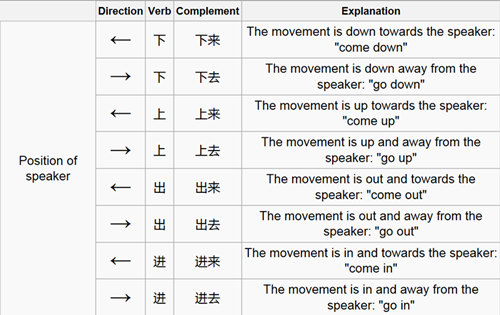- 来(Lái, come)
- 去(Qù, go)
- 上来(Shànglái, come up)
- 上去(Shàngqù, go up)
- 下来(Xiàlái, come down)
- 下去(Xiàqù, go down)
- 出来(Chūlái, come out)
- 出去(Chūqù, go out)
- 进来 (Jìnlái, come in)
- 进去(Jìnqù, go in)
- 回来(Huílái, come back)
- 回去(Huíqù, go back)
- 过来(Guòlái, come here)
- 过去(Guòqù, go over)
The Simple directional complement “ verb+来/去”
In Chinese, Directional Complements (趋向补语 or qūxiàng bǔyǔ) describe the direction of a verb. The most basic and common form of a Directional Complement combines a verb with either 来 (Lái, come) or 去 (Qù, go):
Verb + 来 or 去
When using Directional Complements, it’s essential to consider the speaker’s position. They can be used in a variety of situations and with different verbs. Use 来 when the action moves towards the speaker or becomes closer in any way, and use 去 when the action moves away from the speaker or becomes more distant.
Directional complement examples:

There are many situations where you can use these simple compounds.
Here are some examples:
我在楼上,请你十分钟以后上来。
(Wǒ zài lóu shàng, qǐng nǐ shí fēnzhōng yǐhòu shànglái.)
I’m upstairs. Please come up in ten minutes.
在树上玩很危险,你快下来!
(Zài shù shàng wán hěn wēixiǎn, nǐ kuài xiàlái!)
It’s too dangerous to play in the tree! Come down!
你在楼上等我一下。我一会儿就上去找你。
(Nǐ zài lóu shàng děng wǒ yíxià. Wǒ yìhuǐ’er jiù shàngqù zhǎo nǐ.)
Please wait upstairs for a moment. I’m coming up in a few seconds.
我在楼下,你赶快下来吧。
(Wǒ zài lóu xià, nǐ gǎnkuài xiàlái ba.)
I’m downstairs. Please come down to me.
里面人太多了,你们出来透透气吧。
(Lǐmiàn rén tài duōle, nǐmen chūlái tòu tòuqì ba.)
There are too many people inside. You guys need to come outside and have some fresh air.
请进来吧。
(Qǐng jìnlái ba.)
Please come on in.
他们在外面,咱们出去跟他们见面。
(Tāmen zài wàimiàn, zánmen chūqù gēn tāmen jiànmiàn.)
They are outside. Let ‘s go out and meet them.
他在办公室里等你,你快进去吧。
(Tā zài bàngōngshì lǐ děng nǐ, nǐ kuài jìnqù ba.)
He is waiting for you in his office. You can go in now.
More examples with other verbs:
你什么时候回来?
(Nǐ shénme shíhou huílái?)
When will you come back?
我一会儿就回去。
(Wǒ yìhuǐ’er jiù huíqù.)
I’ll be home in a minute.
我们过去看看。
(Wǒmen guòqù kàn kàn.)
Let’s go over and take a look.
快过来,我们在这儿等你们!
(Kuài guòlái, wǒmen zài zhè’er děng nǐmen!)
Come here, we are waiting for you!
Directional complements are an essential aspect of the Chinese language that describe the direction of a verb. By combining a verb with 来 (lái, come) or 去 (qù, go), we can convey the movement of an action in relation to the speaker. It’s crucial to consider the position of the speaker and the direction of the action to use the correct corresponding complement. With practice and attention to detail, anyone can master the use of these complements in Chinese and improve their language proficiency.
To discover this topic in more detail and see more examples, check out our video explaining the basic and expanded uses of Directional Complements in Chinese.


This Post Has 0 Comments